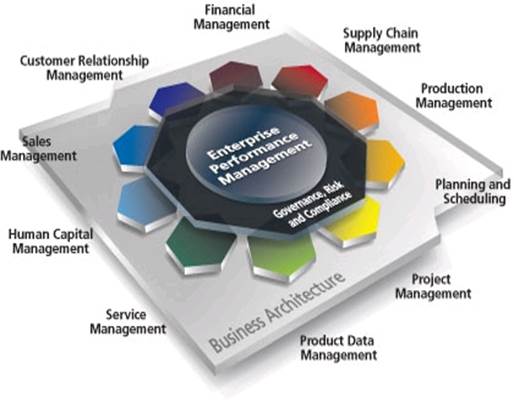Yes, but the depth depends on your
business
ERP (enterprise resource planning) systems
are in-depth solutions that cover multiple facets in your company and are
designed to simplify business processes and ease the burden on your workforce.
"ERP is a term used to describe the software a company uses to run its
business on," says China Martens, an analyst with Forrester Research
(www.forrester.com) in the area of application development and delivery.
"It's a combination of accounting and finance, human resources management,
order management, procurement, project management, and vertical business
processes specific to the industry or industries the company operates in."

ERP
– Enterprise Resource Planning
But having a definition for ERP doesn't
necessarily make its importance abundantly clear. Yes, it's a large part of
your business, but it's difficult to know what constitutes an ERP system and
how you should go about implementing or upgrading one. We'll show you some of
the benefits of utilizing ERP and help you determine whether you're company
will benefit from implementing a new system.
You may already have it
If you're asking yourself whether an ERP is
necessary for your business, George Goodall, senior research analyst with
Info-Tech Research Group (www.infotech.com), has a simple answer: "ERP is
essential for companies of all sizes." But you may also be surprised to
know that your company more than likely already has a functioning ERP system,
even if that isn't what you call it. "Any company or organization that has
to manage financials and assets within the enterprise has some sort of ERP
system," says Goodall. "The real issue that people have is that in
many cases the systems that people use might be underpowered or lack
features."

ERP
is essential for companies of all sizes
As Martens pointed out, an ERP system is
essentially the backbone of all of your business processes. Whether you are
balancing your books for accounting purposes, keeping track of employee
information for HR purposes, or trying to make sure the production floor keeps
its schedule, you're using some form of an ERP system. In fact, simple accounting
programs that many small companies use to balance their books are forms of ERP
systems. The key is to recognize the benefits of having a dedicated ERP system
that goes beyond simple functionality and becomes a management center for your
entire operation.
The benefits of general ERP systems
ERP systems are designed to simplify
process management for companies and make it easier to operate the businesses
themselves. They can often remove the need for manual number crunching and
provide the information necessary to make decisions as they happen rather than
well after the fact. "In general, a key benefit is the ability with ERP to
automate more tasks, workflows, and entire business processes so a company is
less reliant on manual data entry," says Martens. "The goal is to end
up with more timely and accurate data within the ERP system, which users can
then run reports on to gain insight into the company's current operations and
to help plan for the future."
In essence, the biggest benefit of an ERP
system is that it will improve your company's stability now and in the years to
come. It will improve your organization's overall efficiency, minimize data
entry to free up all-important data man hours for other pressing tasks, and
"reduce the amount of time it takes to close books and complete each accounting
cycle," adds Martens. A well-established ERP system will take care of
simple processes and specialized tasks.
Getting specific
Because companies of all sizes should have
some form of ERP in place, it stands to reason that those ERP systems should
also be customizable enough to meet the needs of various industries.
"There are packages built for every industry that you can imagine,
including some shockingly specialized ones," says Goodall. If you have
highly specialized business processes that aren't present in other industries,
communicate with your vendor and implementation partner to ensure those
features are present.
Pick the best possible implementation
partner
If you decide to implement a brand new ERP
system, the most important decision you'll make is who you bring on as your
implementation consultant. According to Goodall, too often companies will get
hung up on who the vendor is or how sophisticated the solution is without
putting enough emphasis on their implementation partner. From his findings,
most companies cite problems with a consultant more often than they complain
about the product itself.
"When we do post hoc analysis and ask
people how their implementation went, they very rarely say that we made the
wrong technology choice," says Goodall. "They say that they had
problems with their integration partner and the implementation process. They
didn't engage their business leadership enough, they didn't prepare for the
cut-over from implementation to operation well enough, or they didn't prepare
their end users. All three of those really have to be done internally with the
help of a consultant."
Goodall recommends that you choose an
implementation consultant at the same time you select your ERP solution to
ensure that individual is experienced and capable of installing your ERP
system correctly. Martens adds that "a company needs to be very engaged
throughout the entire process, particularly if it is heavily reliant on
third-party implementers and integrators." The ERP system you select is
important, but if the solution isn't installed, implemented, and integrated
with the upmost care, you could run into huge problems in the future.
Key points
Recognize that you may already have an ERP
system in place, but you need to make sure that it meets your company's needs.
ERP systems can help automate tasks, ease
the burden on your workforce, and help you better manage your company.
Regardless of your industry, you can find
an ERP solution specialized enough to complete unique tasks.
Make sure you select the best possible
consultant. Even if you choose a good ERP solution, it won't give you maximum
benefits without correct implementation.